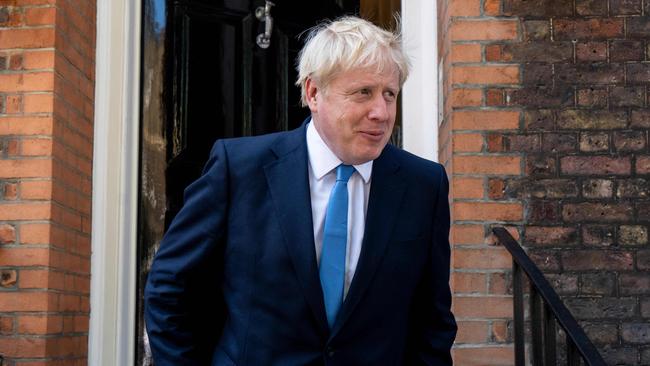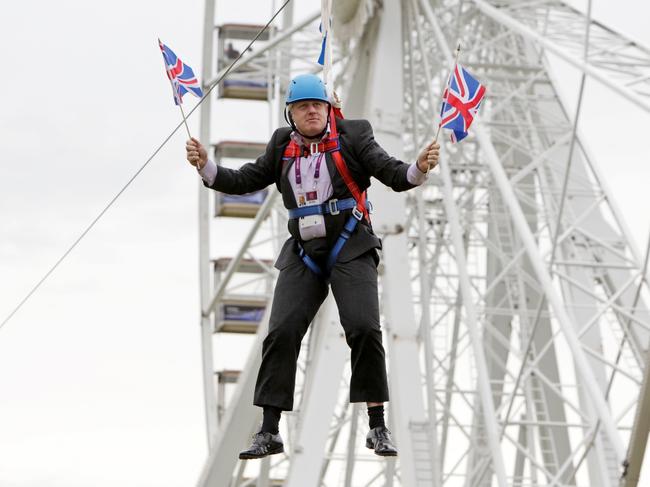Can Boris Johnson steer Britain through Brexit turmoil?
Is Boris Johnson only an opportunist or can he lead Britain through Brexit?

When Boris Johnson saw the zip wire in Victoria Park during the 2012 London Olympics he sprinted for the top.
Opening an attraction with a short speech is not his style. Then London mayor, he had no qualms about the unedifying optics when he was strapped into a harness with a bright blue helmet.
He was handed a small Union flag, but it wasn’t enough. He slid down the zip wire enthusiastically waving two. But his progress down the wire was suddenly halted 20m from the end, leaving him bobbing 3m off the ground.
Park officials later told me the problem wasn’t with the attraction but, rather, Johnson’s inability to know his correct weight.

When I asked Johnson about it, he laughed, ruffled his hair, changed the subject, throwing in a few Latin words I had to look up — all classic Boris manoeuvres to charm and deflect.
Since then he has lost 8kg by eschewing late-night chorizo and cheese binges and reducing his alcohol intake. Under the influence of girlfriend Carrie Symonds, his self-consciously scruffy look was sharpened as he came into the reckoning to be the next British prime minister.
But the slightly more statesmanlike appearance is not the reason for his rise. That comes down to his direct Brexit messaging, which has won over a generation of Tory members fed up with the meanderings of the Conservative-led coalition government under Prime Minister Theresa May.
Foes loom
Yet Johnson still has fierce enemies. Cabinet ministers such as the Remainer Chancellor Philip Hammond are to resign. Others have threatened to side with the Liberal Democrat and the Labour parties in a vote of no-confidence to force a general election.
The 160,000 Tory members, mostly white and male, see Johnson as the only person able to woo Brexiteers away from Nigel Farage’s Brexit Party in an election and capitalise on a weakened Jeremy Corbyn-led Labour Party.
The next prime minister inherits the parliamentary arithmetic created by May’s 2017 election. The effective majority is three, but more than a handful of pro-Remain Tory MPs will try to scupper Johnson’s promise of Brexit no matter what come October 31.
Critics continue to label him a buffoon who tells people what they want to hear, rather than sticking to the government line.
He has been blamed for creating problems for Nazanin Zaghari-Ratcliffe, an Iranian dual national detained in Tehran for spying in 2016.
As British foreign secretary, Johnson told a parliamentary committee: “She was simply teaching people journalism.” The Iranians used the comment to extend her sentence. Now, his first international crisis if he moves into No 10 will be to deal with Iran over tensions in the Persian Gulf.
He is accused of being racist, writing last August in his column for London newspaper The Telegraph that it is “absolutely ridiculous that people should choose to go around looking like letter boxes” — a reference to Muslim women wearing the burka. In the same paragraph he disagreed with Denmark’s ban on women being able to wear the hijab in public.
But he is his own man and his supporters appreciate his conviction when he takes on issues, such as his popular London bike-rental scheme and his resistance to the Cameron government when it tried to push poor inner-London communities into the outer suburbs. “We will not accept any Kosovo-style ethnic cleansing on my watch,’’ he declared, much to the annoyance of then prime minister David Cameron, his schoolmate from Eton and Oxford.
He is also pro-immigration, arguing the 2016 Brexit referendum was more about a desire for control over Britain than any anti-immigration backlash.
Ever since Johnson spent a gap year in the early 1980s as a teacher at Timbertop, a campus of Geelong Grammar School in Victoria, he has advocated more “can-do Australian vigour’’. He was named an honorary Australian of the Year five years ago.
Political strategist Lynton Crosby, a close friend and adviser to Johnson and the architect of the Tories’ 2016 election win, said back then: “Boris says what he thinks, much like the average Australian, and he has no airs and graces like the typical Aussie, too.”
Fake newsman
Books have been written about Johnson’s colourful time in Brussels as the Telegraph’s correspondent. It is generally acknowledged, even by him, that he stretched the truth to poke fun at EU bureaucracy.
The EU banning curved bananas? Johnson wrote that. The EU allegedly planning to restrict the size of condoms — and thus not accommodating the British requirements — was his, too.
Former Telegraph editor Max Hastings has been caustic about his one-time employee. Their close friendship was destroyed, I have been reliably told, when Johnson allegedly failed pay up on a bet. Hastings wrote in The Guardian on June 24: “While he is a brilliant entertainer who made a popular maitre d’ for London as its mayor, he is unfit for national office because it seems he cares for no interest save his own fame and gratification … His premiership will almost certainly reveal a contempt for rules, precedent, order and stability.”
Yet Boris — real name Alexander Boris de Pfeffel Johnson and still called Al by his closest family and friends — is a constant surprise. During his campaign to be re-elected as London mayor, a man yelled at him in Polish. Johnson turned back and engaged the man in a sprightly conversation — in Polish. No one, least of all his communications chief at the time, Guto Harri, knew his mastery of languages extended past French.
Keith Perry, a former sports editor at The Telegraph, says his first impression when Johnson arrived in the daily news conference was: “Who the hell is this? He is away from another planet.”
But he quickly came to appreciate Johnson’s ability to see the big picture, particularly when the future prime minister was editor of the Monday edition of the paper.
“He’s anxious not to seem forensic because he is forensic,” says Perry, adding Johnson has the abilities to be prime minister. “He’d ask sports questions and feign he didn’t know what was going on when he not only knows the question, he knows the answer.”
Bumbling persona
Others say the bumbling persona is designed in part to make others feel comfortable, because he’s good fun and doesn’t want to appear superior.
Johnson said as much during a 2014 film Boris Johnson: The Irresistible Rise: “As a general tactic in life, it is often useful to give the slight impression you are deliberately pretending not to know what is going on because the reality might be you don’t know what is going on.”
Telegraph deputy editor Neil Derbyshire recognised that Johnson might become prime minister when he was briefing broadcaster Michael Parkinson, who was looking for anecdotes about Johnson after he was elected MP for Henley in 2001. He told Parkinson that Johnson had to decide whether to be the buffoon or the prime minister, with the caveat that he had to “sort out the other side of his life” — women.
Hastings gave the same advice directly when Johnson was seeking his counsel about standing for London mayor.
“I said, ‘Yes, but lock up your willie’,” Hastings says.
On Johnson’s Wikipedia page is the line “Children: five or six”.
But the real questions are over Johnson’s work ethic, an alleged sense of entitlement, the enormous privilege he enjoyed growing up in the heart of the British aristocracy and his tendency to “wing it”, relying on his charm to win over opponents.
Only Johnson could get away with answering a question about whether he has serious convictions by saying: “Yes, one for speeding.”



To join the conversation, please log in. Don't have an account? Register
Join the conversation, you are commenting as Logout